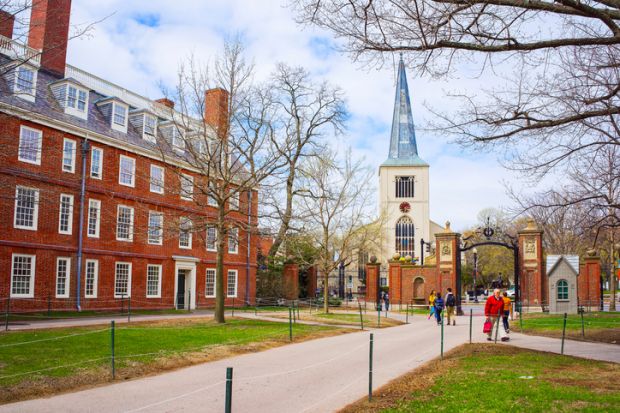More than a third of top US professors who did their PhDs in the country gained their doctorate at just five institutions, according to a new analysis.
The research, which looked at where 12,500 full professors at 48 US universities did their PhDs, found that, of those who studied in the US, 4,400 of them gained their doctorate at the University of California, Berkeley, the Massachusetts Institute of Technology or Stanford, Harvard or Princeton universities.
Tolga Yuret, an associate professor in the department of economics at Istanbul Technical University, who analysed the data, found that the concentration was even greater in some disciplines.
For instance, in economics, almost half the professors did their PhDs at these five institutions and 20 universities were responsible for the doctoral education of almost 90 per cent of the professors.
In all but two of 16 disciplines analysed, at least 40 per cent of the professors gained their doctorates at five universities, although these institutions were often different in each subject area. In only two fields – psychology and bioengineering – did a smaller share receive their doctorate from the top five US institutions for PhD alumni who became elite academics.
In his paper, published in the October edition of Scientometrics, Dr Yuret also looked at the backgrounds of 9,105 professors at the 48 universities – selected owing to their being in the top 100 of the Academic Ranking of World Universities – who did their undergraduate degrees in the US.
This was more dispersed than for doctorates, with five universities accounting for 20 per cent of the professors’ undergraduate degrees across all fields, although again in some disciplines the concentration was higher. In physics, for example, five institutions educated 35 per cent of the professors at bachelor’s level.
However, Dr Yuret also writes that it is “interesting to note that the academic future is mainly decided at the undergraduate level” in terms of disciplines. For example, “few Harvard graduates” become engineering professors while at the same time an “MIT graduate is very unlikely to become a humanities professor”.
While he acknowledges in the paper that some of his results are affected by the size and specialisms of institutions, Dr Yuret told Times Higher Education that the degree of concentration had important implications, especially for diversity in academia.
“I cannot say that the situation in [the] US is unhealthy, because the PhD programmes are very good and attract the best students from the world,” he said.
“Yet the concentration is alarming for equality. If a student is not from a wealthy family and the public universities in her state [are not among] the top public universities, she has very small chance to become an elite academic.”
The paper also finds that while 47 per cent of professors in public universities gained their PhD from a private university, just 30 per cent of professors at private universities got their PhD at a public institution.
Find out more about THE DataPoints
THE DataPoints is designed with the forward-looking and growth-minded institution in view
Register to continue
Why register?
- Registration is free and only takes a moment
- Once registered, you can read 3 articles a month
- Sign up for our newsletter
Subscribe
Or subscribe for unlimited access to:
- Unlimited access to news, views, insights & reviews
- Digital editions
- Digital access to THE’s university and college rankings analysis
Already registered or a current subscriber?

